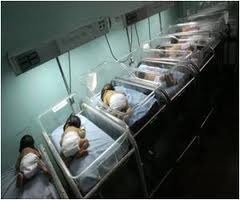Babies born with low birth weight is five times more likely than the general population is diagnosed with some form of autism, new research shows.
The study is the first in the United States to examine the prevalence of autism diagnoses in the smallest babies. Advances in medicine have helped more lower birth weight babies to survive, so the results may help to explain the increase in people diagnosed with autism disorder, the researchers said.

Premature infants are often born low birth weight, although the full-term baby may also be in order.
Researchers at the University of Pennsylvania, Department of Nursing and the School of Medicine identified 1105 children who weighed less than 4 pounds, 6.5 ounces (2000 grams) at birth who were born October 1, 1984, and 03 July 1989.
Sixteen years later, the researchers were able to achieve 623 of those children, and used a questionnaire to screen the autism spectrum disorders.
When the 189 children turned 21 years of age, 60 percent of those screened positive for autism spectrum disorder, and 24 percent of those who screened negative were clinically diagnosed condition. Overall, the number of autism spectrum disorders one of the participants, who have low birth weight was five times higher than the general population.
Autistic problems
People with disorders are difficult to communicate, difficulty interacting in social situations, and restrictive or repetitive interests, said study co-author Jennifer Pinto-Martin, a researcher at the University of Pennsylvania School of Nursing and the School of Medicine.
Those with a mild autism spectrum disorders, such as people with Asperger’s syndrome, “may just want to talk about one subject,” Pinto-Martin said. “They are fully functional. They can go to college. Be able to go to work.”
The lower activity of people with autism spectrum can be no social interaction at all. “You can see them sitting in a corner, rocking back and forth,” Pinto-Martin said.
Scientists believe that the brain hemorrhaging and bruising associated with low birth weight or premature infants could explain the higher autism spectrum disorders.
“The first hypothesis is that it is linked to brain development,” Pinto-Martin said. “Preemies is something called the neonatal brain damage. In some cases, it is just like a bruise, and does not really make any difference. In other cases, there are more long-term effect.”
Medical interventions that keep premature babies alive could also play a role, Pinto-Martin said. “Keep them alive, a lot of technology involved,” he said. “They are the machines that help them breathe. They are a lot of drugs.”
“Quantity premature birth and early survival has increased dramatically,” he continued. “It may well be that because we are better to keep these preemies alive, we will create an increased incidence of autism.”
Could a better prenatal care reduces the incidence of autism?
The study confirms what doctors have known for a premature birth and autism, said Dr. Craig Erickson chief Christian Sarkine Autism Treatment Center at Indiana University School of Medicine. Autism may be more likely to develop after premature birth together with other factors such as environment and genetic predisposition, he said.
“It is not surprising, that would be a risk factor for autism,” he said. “The nice thing about this study is that they had a long follow-up period. By [21 years], you really know if people have autism or not.”
Next, the researchers hope to compare brain images of low birth weight babies in the investigation. Head ultrasounds are now routine for premature babies, Pinto-Martin said. “The first thing we do is go back and look at interest rates of brain injury and brain hemorrhage the entire cohort,” he said.
According to the study needed not only to better prenatal care to reduce the number of premature babies, but also the need for early diagnosis and intervention for autism. “Some of these young adults, thanked us when we gave them a diagnosis,” Pinto-Martin said. “They said:” I’ve always felt weird and I do not know why. “It was very moving for us.”


